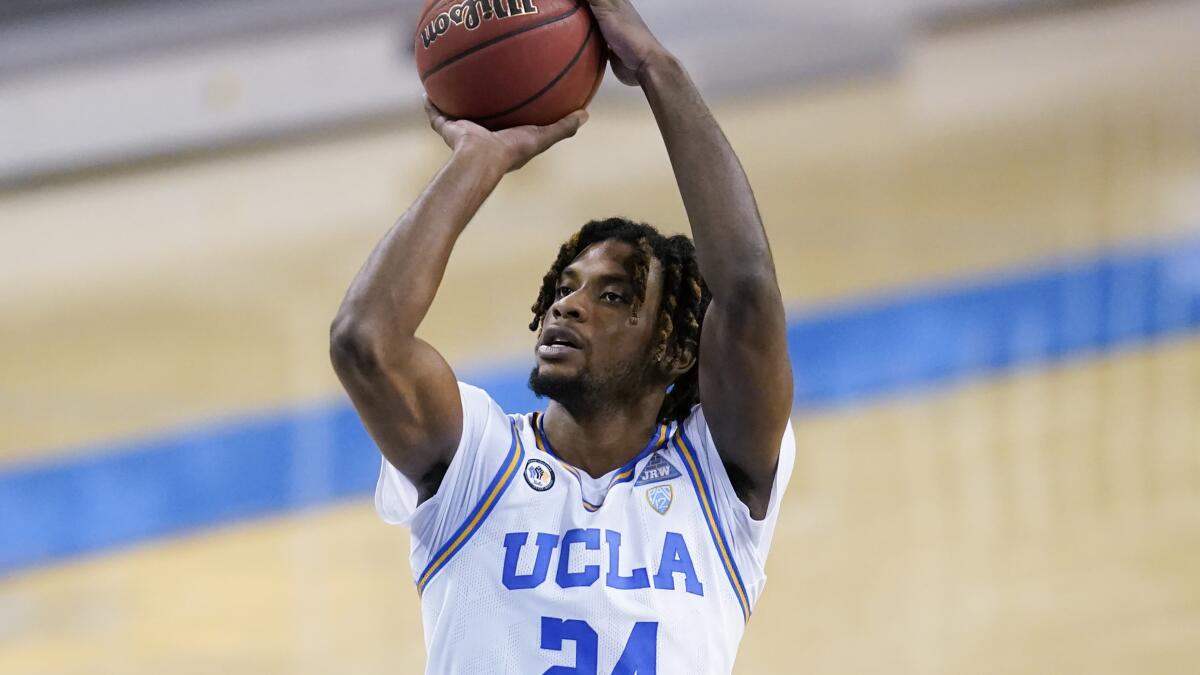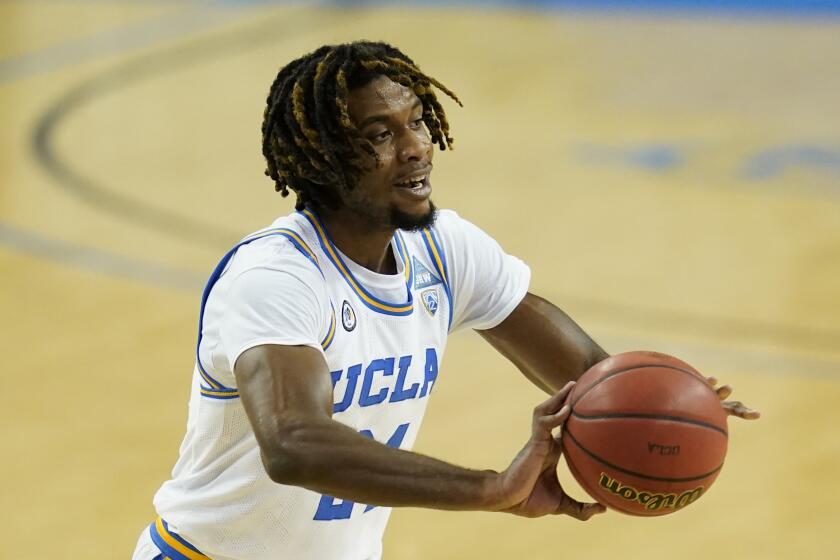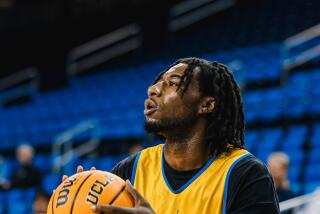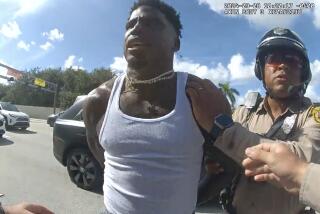For UCLA’s Jalen Hill, a sport surrendered meant a crushing burden lifted

At his lowest moment, amid the sleepless nights and trouble keeping food down, Jalen Hill didn’t want to leave his room.
It was an agony he had never felt, different from all the previous inner turmoil. He had suffered from panic attacks since high school, withstood the humiliation of an international shoplifting scandal before he played his first game for UCLA, and acknowledged anxiety and depression that could be debilitating.
This was a burden borne of the weight he felt to succeed with the Bruins in his redshirt junior season. Hill tried to push through it, blunting the pain with alcoholic beverages after games. He talked about his struggles with his roommate, Tyger Campbell, and that helped to a degree.
Nothing could fully ease the intractable hurt. Midway through the season, another restless night left Hill lying in bed, not wanting to do anything or see anyone. He knew then that he needed to save himself by giving up something that had once defined him.
The game he loved.
“I’m just like, nah, I need to take this break,” Hill told The Times on Friday, recalling his decision to leave the team in early February. “It was a tough decision to make, but once I knew what I had to do, it wasn’t hard, like I figured out, like, this is going to help me.”
UCLA’s Jalen Hill said on Instagram that he was retiring from basketball, citing ‘anxiety and depression problems’ that started after his arrest in China.
Walking away from basketball allowed Hill to focus on himself as a person instead of the power forward who was always measuring himself against his counterparts on the court. The relief was so overwhelming that Hill made the move permanent, announcing his retirement from the game earlier this week in an Instagram video that’s been viewed more than 12,600 times.
Victories now come in new ways, in feeling better than the previous day and understanding that his own internal scoreboard is the only one that matters.
“That pressure of trying to be better than somebody else like day in and day out, you’re either winning or you’re losing,” Hill said. “Now every day it just seems like I’m winning because I’m here, I’m alive and my mental state has changed immensely.”
The thousands of supportive texts, phone calls, social media messages and emails Hill has received since releasing his video prompted him to detail his mental health problems because he wanted others going through similar issues to understand the outpouring of love that’s available if they seek it.
UCLA athletic director Martin Jarmond expects a big return on investment for the entire school after the men’s basketball team’s historic Final Four run.
An introvert by nature, Hill said the COVID-19 pandemic allowed him to freely live in isolation, rarely leaving his room except for practices and games. He kept his struggles mostly to himself, telling Campbell and a UCLA therapist, but wishes he had cast a wider net in seeking help.
“Nobody knew, and the main reason nobody knew was because I wasn’t telling anybody,” Hill said. “So when people know, you feel more comfortable, you feel the ability to step out of your box instead of just being confined to your mind.”
Hill’s UCLA career had been rocky long before this season. A shoplifting incident in China before his freshman season that also involved teammates Cody Riley and LiAngelo Ball led to the season-long suspensions of Riley and Hill and Ball’s decision to leave.
Michigan students taunted the Bruins by waving miniature Chinese flags during a game. Even one of Hill’s fellow UCLA students sent him into a funk by trying to surreptitiously take a photo with his phone. Hill realized what the student was doing, a reminder of his transgression and the likelihood that it would remain a lifelong stain.
The itinerary called for a week of international goodwill events for UCLA’s basketball team leading up to its season opener.
As a redshirt freshman, Hill was a part-time starter on a team that missed the NCAA tournament. The next season was his best, Hill more than doubling his scoring average while starting 25 of 30 games and becoming the Bruins’ top rebounder and interior defender.
After missing the first two games this season because of knee tendinitis, Hill returned but never rounded into form. He played in 14 games, his averages of 6.5 points and 5.9 rebounds both down from the previous season. After games, he would return to his apartment and comfort himself with alcohol.
“Pretty much trying to convince myself I was doing it because I was celebrating a win or something like that,” Hill said, “but deep down in my mind knowing that that’s not the case.”
His departure from the Bruins came before the first cross-town rivalry game against USC on Feb. 6. The team announced only that he was absent because of personal issues. Hill watched on television and felt pangs of guilt, especially because an ankle injury that sidelined Riley left the Bruins without their top two big men for what became a blowout loss.
Any regrets quickly faded as Hill began to assess his progress. He meditated when he woke up and before he went to bed, the reverie helping him focus on staying in the present and calming an overactive mind that tended to heighten his distress. It also helped him ward off the panic attacks that have tormented him since his junior year at Corona Centennial High, when he had to ask to be excused from class to compose himself amid a rapid onset of anxiety.
“It’s practicing, slowing your breath down,” Hill said of his new remedy, “so when those panic attacks do come you’re prepared for them instead of thinking that the world’s ending.”
Alfredo Ponce, an artist in Northern California who attended USC grad school, was so inspired by UCLA’s run to the Final Four of the NCAA tournament that he created Bruins trading cards whose vibrant, colorful designs are reminiscent of loteria cards.
By the time UCLA commenced its riveting run to the Final Four, Hill’s only regret was that he could not be there to cheer on his teammates in person. He had returned to his home in Corona, where he watched every game, and said he’s only two or three quarters away from completing his degree in history.
His coaches and teammates have routinely checked in on him, coach Mick Cronin offering encouragement during lengthy phone calls. After the Bruins returned to Southern California following their loss to Gonzaga in a national semifinal, Hill drove Campbell to the airport, one friend helping another once more.
One of Hill’s biggest takeaways from his experience is that no one should feel alone. He’s vowed to reply to anyone struggling with mental health issues who contacts him through his Instagram account, acknowledging that his response might take a while because he’s not usually active on social media.
His advice in a nutshell: Think about where you want to be, not where you are.
“Focus on the good things,” Hill said, “because when you get into a situation where you are anxious or you are going through mental health problems, you tend to focus on only that and that’s pretty much the only thing that you’re going to get because that’s the only thing that your mind is focused on.
“So, instead, try to focus on the small things and you don’t have to lie to yourself, just be aware of the fact that what you’re going through is what you’re going through, but saying that the next day is going to be better and that’s not a lie at all — but instead of just saying it, knowing it, knowing that the next day is going to be better, knowing that whichever opportunity you’re going to get next is going to be a successful one.”
Everything’s going to work out, Hill has decided. He’s no longer locked in that cycle of dread, happily stepping outside of his comfort zone, and out of his room, life wrapping him in a warm embrace.
More to Read
Go beyond the scoreboard
Get the latest on L.A.'s teams in the daily Sports Report newsletter.
You may occasionally receive promotional content from the Los Angeles Times.








